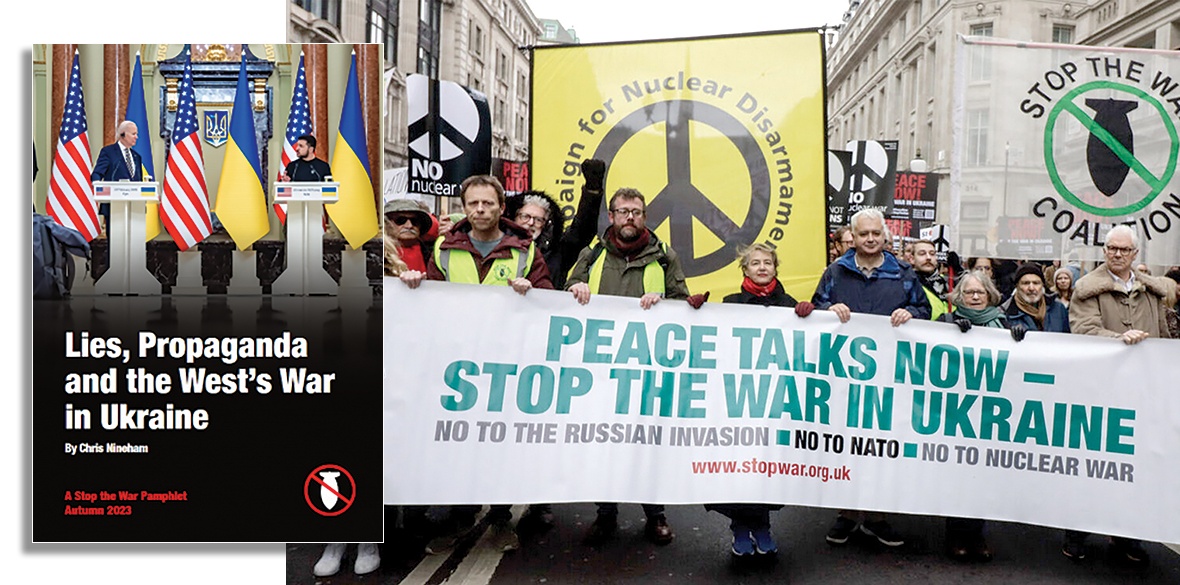This is the last article you can read this month
You can read more article this month
You can read more articles this month
Sorry your limit is up for this month
Reset on:
Please help support the Morning Star by subscribing here
Lies, Propaganda and the West’s War in Ukraine
by Chris Nineham
Stop the War, £5
BRITAIN’S peace movement is being silenced — though not, in the eyes of its enemies, comprehensively enough, as we saw with former Jeremy Corbyn aide Andrew Fisher’s plea to wind up the Stop the War Coalition this month.
There are various motivations for the unprecedented ban on Labour MPs questioning Nato, the dramatic increase in censorship of alternative narratives online and the (Morning Star excepted) wall-to-wall media support for fighting Russia to the last Ukrainian.
Alignment of most media behind the foreign policy aims of our ruling class is not new — it was visible in previous conflicts, like Iraq or Libya, where our government’s lies went largely unquestioned and the purity of its motives was taken for granted across the mainstream press.
Labour’s crackdown on dissent is linked to the trauma inflicted on warmongers by five years of being led by the anti-imperialist Corbyn.
But most ominously of all, in a world rapidly arming and hurtling toward potential global conflict with China, the silencing of the anti-war movement is a preparatory step.
That point is made eloquently in Chris Nineham’s new Stop the War pamphlet. “If people really knew the truth, the war would stop tomorrow,” he quotes first world war premier David Lloyd George on the very first page. And Lies, Propaganda and the West’s War in Ukraine is a step-by-step exposé of the techniques used to stop people querying the official account of why this war is being fought.
A quick read at 32 pages, this is a useful primer for engaging those who back the British government’s approach to the Ukraine war — a position currently dominant on much of the left and in the trade union movement.
A run-through of the lies and distortions used to justify repeated acts of aggression against other countries demolishes any notion that our government or media are trustworthy or well intentioned. As Irish MEP Clare Daly told the recent Stop the War AGM, the serial aggressors of Yugoslavia, Afghanistan, Iraq and Libya have not suddenly become peacemakers in Ukraine.
Hyperbolic demonisation of the enemy is also detailed, with accusations that Putin is the new Hitler falling flatter when the full list of “new Hitlers” our media has identified over the years, coinciding closely with whichever enemy our country was focused on at the time, is revealed.
When pointing to the way causes of the war including Nato’s eastward expansion and the fallout from the 2014 Maidan coup in Ukraine have been erased, Nineham points to the voluminous, and easy to access, evidence of these from a constellation of analysts, experts and senior US diplomats, concluding grimly that “attacks on anti-war voices pointing out Nato’s role ... are not just hypocritical but deliberately deceitful.”
His reference to the concerted pressure placed on venues, from Quaker meeting halls to trade union offices, to refuse permission for anti-war events is important as under-reported. “Cancel culture” has come for the peace movement in a big way and the left needs to exert countering pressure.
The scale and severity of the wars our rulers now contemplate is barely imaginable to most citizens and would certainly be opposed if understood: so those sounding the alarm must be relentlessly attacked.
The organisation that mounted the biggest demonstration in British history, Stop the War, is first in line because of its very success in shifting British opinion against war from 2003 onwards, as well as because of its role as an incubator of what became the Corbyn movement.
Far from being time for it to shut up shop, it has rarely been more needed. This pamphlet illustrates why, and should be pressed into the hands of trade union activists.

 Ben Chacko
Ben Chacko







